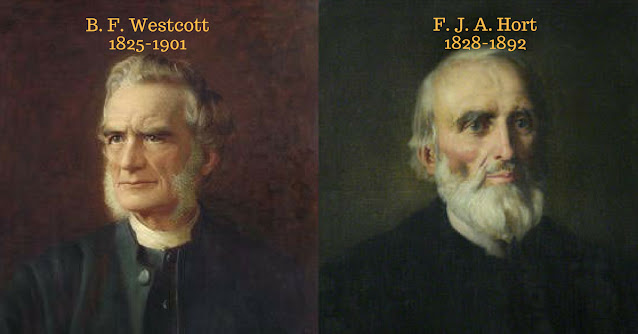The following is quoted directly from Christian Forums
https://www.christianforums.com/threads/interesting-quotes-from-westcott-and-hort.7307183/
Brooke Foss Westcott (an Anglican bishop and professor at Cambridge University) and Fenton John Anthony Hort (also an ordained priest and professor at Cambridge) produced a Greek New Testament in 1881 based on the findings of Tischendorf. This Greek New Testament was the basis for the Revised Version of that same year. They also developed a theory of textual criticism which underlay their Greek New Testament and several other Greek New Testaments since (including the Nestle-Aland text).
Their interpretation is the basis of many New Testament bibles. but these two adhere to textual criticism which, in their judgement, invalidated certain passages of the bible. Textual Criticism referencing only these five sources:
Codex Vatican (B)
Codex Sinaiticus (Aleph)
Codex Alexandrian (A)
Codex Ephraemi (C)
Codex Bezae (D)
Whereas the KJB that isn't translated from the Westcott-Hort translation refences around 5000 original manuscripts.
Anyway see if you would want these men doing a Greek translation for you. Here's some of their own quotes from their own writings.
"(John) does not expressly affirm the identification of the Word with Jesus Christ." (Westcott, Ibid., p. 16).
"Our Bible as well as our Faith is a mere compromise." (Westcott, On the Canon of the New Testament, p. vii).
"Evangelicals seem to me perverted. . .There are, I fear, still more serious differences between us on the subject of authority, especially the authority of the Bible." (Hort, The Life and Letters of Fenton John Anthony Hort, Vol. I, p.400)
"No one now, I suppose, holds that the first three chapters of Genesis, for example, give a literal history. I could never understand how anyone reading them with open eyes could think they did." (Westcott, cited from Which Bible?, p. 191).
"But the book which has most engaged me is Darwin. Whatever may be thought of it, it is a book that one is proud to be contemporary with..... My feeling is strong that the theory is unanswerable." (Hort, cited from Which Bible?, p. 189)
"I think I mentioned to you before Campbell's book on the Atonement, which is invaluable as far as it goes; but unluckily he knows nothing except Protestant theology." (Hort, Life and Letters, Vol. I, p. 322)
"The popular doctrine of substitution is an immoral and material counterfeit...nothing can be more unscriptural than the limiting of Christ's bearing our sins and sufferings to His death; but indeed that is only one aspect of an almost universal heresy." (Hort to Westcott, Life and Letters, Vol. I, p. 430)
"I confess I have no repugnance to the primitive doctrine of a ransom paid to Satan. I can see no other possible form in which the doctrine of a ransom is at all tenable; anything is better than the doctrine of a ransom to the father." (Hort, The First Epistle of St. Peter 1:1-2:17, p. 77).
"It is of course true that we can only know God through human forms, but then I think the whole Bible echoes the language of Genesis 1:27 and so assures us that human forms are divine forms." (Hort to Westcott, August 14, 1860)
"Protestants (must) unlearn the crazy horror of the idea of Priesthood." (Hort, Life and Letters, Volume II, pp. 49-51)
"I wish I could see to what forgotten truth Mariolatry (the worship of the Virgin Mary) bears witness." (Westcott, Ibid. )
"I have been persuaded for many years that Mary-Worship and Jesus-Worship have very much in common." (Hort, Life and Letters, Volume II, pp. 49-51)
"The pure Romanish view seems to be nearer, and more likely to lead to the truth than the Evangelical." (Hort, Life and Letters, Vol. I, p. 77)
"I agree with you in thinking it a pity that Maurice verbally repudiates purgatory . . . the idea of purgation, cleansing by fire, seems to me inseparable from what the Bible teaches us of the Divine chastisements." (Hort, Life and Letters, Vol. II, pp. 336,337)
"It is quite impossible to judge the value of what appear to be trifling alterations merely by reading them one after another. Taken together, they have often important bearings which few would think of at first. . . The difference between a picture, say of Raffaelle, and a feeble copy of it is made up of a number of trivial differences. . . We have successfully resisted being warned off dangerous ground, where the needs of revision required that it should not be shirked. . . It is, one can hardly doubt, the beginning of a new period in Church history. So far the angry objectors have reason for their astonishment." (Hort, Life and Letters, Vol.I, pp. 138,139)

